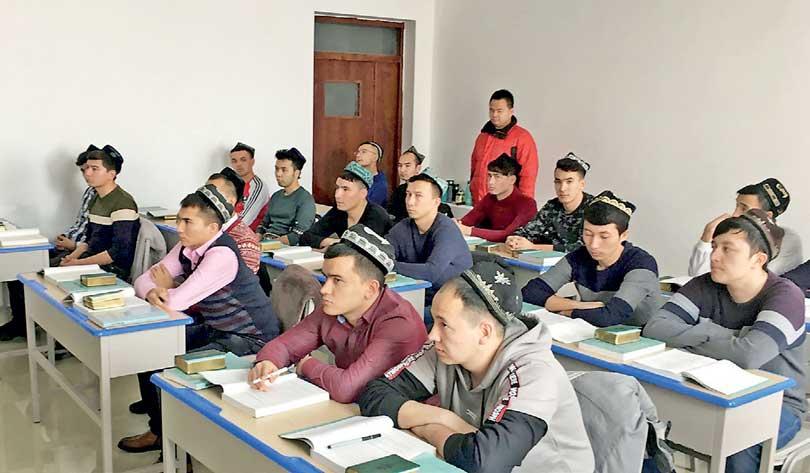Reply To:
Name - Reply Comment

A class in a Chinese Uygur rehabilitation camp
 Like what Sri Lanka did with the 12,000 surrendered LTTE cadres after winning Eelam War IV in 2009, China is re-educating and rehabilitating suspected and confirmed Islamic radicals from the troubled Muslim-majority Xinjiang province.
Like what Sri Lanka did with the 12,000 surrendered LTTE cadres after winning Eelam War IV in 2009, China is re-educating and rehabilitating suspected and confirmed Islamic radicals from the troubled Muslim-majority Xinjiang province.
The difference between the Lankan and Chinese schemes appears to be in planning and organising. While the Lankan rehabilitation camps were ad hoc (for a year), hastily planned and put together, and army-run, the Chinese institutions are well-planned, well-executed, civilian-run, and of a permanent nature given the fact that Islamic radicalism is going to be a long-term problem in Western China.
According to the latest report on Vocational Education and Training in Xinjiang presented by the State Council Information Office of the Chinese government, the purpose of the rehabilitation institutions is to cleanse the minds of the youth of religious radicalism and get them to adjust to, and function in, the established Chinese socio-political and secular ideological order. The report stresses that there is no ban on the practice of Islam but only on the intolerance and separatism associated with it these days due to outside influences.
However, as in the case of the post-war Lankan rehabilitation programme, the Chinese scheme has also come under heavy fire from Western human rights agencies and the Western media. The widely circulated view outside China is that a million Uygur Muslims have been put in barbed-wired “concentration camps” for brain washing them into giving up Islam and their traditional culture in favour of the Chinese language and Chinese culture.
But the government report says that this is not the case. In fact, thanks to re-education, China has successfully minimized extremist religious thinking in Xinjiang.
The Chinese method is a combination of prevention, correction and punishment it says. China does not have one law that applies to all shades of radicalism. Distinction is made between the hard core and the peripherals, the radicalised and the radicalizing, those in radicalism out of conviction and those coerced into it, those who repent and those who are adamant. While the State is hard on the hard nuts, it is soft and rehabilitative in regard to the others, the report says. The State gives equal importance to prevention and correction.
The idea is to catch them young, and put them through a holistic educational process, which, though essentially job oriented, contains subjects to make them law abiding citizens of a united and modern China, a China devoid of obscurantism, exclusivity and hatred towards other communities and “non-believers”.
Job Orientation

Job-orientation is clearly basic to the scheme. Beijing is acutely aware that joblessness leads to unrest and an idle mind is the devil’s workshop. And joblessness is a problem in Xinjiang due to the low level of economic development. There is an excessive dependence on agriculture in the absence of industrial development. This lowers productive employment and raises idleness. Vocational education combined with training in standard Chinese would help the Xinjiang Uygur Muslim youth to set up their own businesses or get jobs in other parts of China.
Lack of knowledge of standard Chinese and absence of spatial mobility in the absence of linguistic and technical skills, has led to isolation and exclusivism and a fear of and hatred for non-Uygurs and non-Muslims.
The government report claims that the success of the rehabilitation process could be seen on the ground. “Religious extremism has been effectively eliminated. Through education, the vast majority of trainees can now recognize the nature of terrorism and religious extremism, and free themselves from the control of these phenomena,” the report says.
“The trainees have a much better awareness of the interests of the nation, their civic duties, and the rule of law, and their ability to distinguish between right and wrong has significantly improved. Most of the trainees are able to recognize that religious extremism is a perversion of their religion, and their ability to resist its penetration has notably increased,” it says.
In the course of the trainees’ studies and daily life, the trainers carefully guide them to show mutual respect for different folkways and encourage adaptation to the requirements of modern society in terms of food, clothing, housing, transport, weddings, funerals, etiquette and customs, it adds.
“The centers also vigorously spread the concept of modern civilization, so that trainees can divest themselves of out-dated conventions and customs. Xinjiang citizens now consciously resist religious extremism, and the trend in society is now to pursue knowledge of modern science and technology and a cultured way of life,” the report adds.
Tourism booming in absence of Terror
The report notes that no terrorist incidents have occurred in Xinjiang for nearly three years since the education and training started.
“In 2018, tourism in Xinjiang grew rapidly: Tourists from inside and outside China totalled over 150 million, a year-on-year increase of 40%; foreign tourists numbered 2.6 million, a year-on-year increase of nearly 12%. From January to June 2019, nearly 76 million tourists visited Xinjiang, an increase of 46% over the same period in 2018,” the report says.
Foreign Media Surprised
To counter hostile reports in the Western media, the Chinese authorities took parties of journalists and diplomats on tours of the educational camps in July. While some reports quoted locals as saying that the barbed wires had been removed prior to the journalists’ visit to give a picture of normalcy, others were positive.
On July 5, 2019,The Straits Times of Singapore published an article entitled “Inside Those Uighur Re-education Camps” written by Ravi Velloor, associate editor of the newspaper, in which he said: “From an administrative point of view, the measures have been effective without question.” He felt that the training centers “had the air of a boarding school”.
Velloor found that in the housing blocks being built for the poorer sections, in the hospitals where people can access medical services, including moxibustion (a form of Eastern medical treatment) , in the thriving bazaars where the locals ply their trade, and in the cities of Xinjiang where people enjoy ethnic song and dance performances no suppression of the local culture was evident. Velloor went on to say that China’s fears about radical Islam and the steps it is taking to counter it, are legitimate.
The US magazine International Focus published an article by Val Thompson which was more emphatic. In the article entitled “A Journey to the Autonomous Region of Xinjiang, China” in the May 2019 issue Thompson says: “A visit to Kashgar Vocation Skills Educational and Training Centre, which I found well organized with young people, was mostly of the Uyghur ethnicity. The young people, men and women, were, or could be, victims of extremist teaching, now were learning a vocational skill and being taught a better way of life... They were well fed, and they had good sleeping conditions... I interviewed several of them; they seemed very happy; and they were treated well by their supervisors. For those who want to believe these young people may have been coerced, I say you can’t fake happiness; and happiness is exactly what I saw.”
This is a far cry from the situation that existed between 1990 and the end of 2016, the government says. Separatists, religious extremists and terrorists had plotted and carried out several thousand acts of terrorism such as bombings, assassinations, poisoning, arson, assaults, and riots in Xinjiang. Many innocent people were killed and several hundred police officers died in the line of duty. The property losses incurred were enormous, the government report recalled.